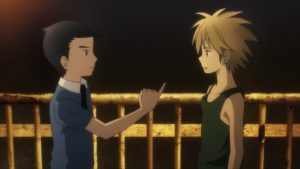 If you want a measure of just how overrun I am this season, Piano no Mori is it. This show is solidly in my upper tier for the season, and I flat-out forgot to watch it last week. Yeah it’s not bring streamed and subs are mildly erratic, but man – I’ve forgotten about shows a time or two before, but never one I would rank this highly. In trying to put together a quickie season check-in there are almost 20 series I’m at least considering as possible coverage candidates this season, and that’s just too many. Most of them aren’t great and it’s not a great season on the whole, but it is a jam-packed one.
If you want a measure of just how overrun I am this season, Piano no Mori is it. This show is solidly in my upper tier for the season, and I flat-out forgot to watch it last week. Yeah it’s not bring streamed and subs are mildly erratic, but man – I’ve forgotten about shows a time or two before, but never one I would rank this highly. In trying to put together a quickie season check-in there are almost 20 series I’m at least considering as possible coverage candidates this season, and that’s just too many. Most of them aren’t great and it’s not a great season on the whole, but it is a jam-packed one.
 I can definitely see the pacing at work in these two episodes – they totally work for me but yes, things are moving quickly. Gainax is doing what is often done in these kinds of reboots – trying to move through the previously-adapted parts quickly and get to the new material. It’s a shame in the sense that this is a great part of the story, but I do get it. That means we power through all the way to the competition this week (though only the start of it) and that means our first real look at the rivalry between Shuu and Kai.
I can definitely see the pacing at work in these two episodes – they totally work for me but yes, things are moving quickly. Gainax is doing what is often done in these kinds of reboots – trying to move through the previously-adapted parts quickly and get to the new material. It’s a shame in the sense that this is a great part of the story, but I do get it. That means we power through all the way to the competition this week (though only the start of it) and that means our first real look at the rivalry between Shuu and Kai.
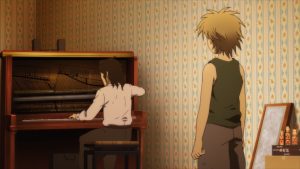 It doesn’t hurt that we’re dealing with the sublime K.280 from Mozart here – I’m even more partial to the ethereally beautiful K.310 myself (I recommend this version, by the premiere modern interpreter of Mozart, Radu Lupu), but music just doesn’t get much better than this. What we’re seeing of course is a rather classic contrast between the two boys – the technical brilliance of Shuu, and the raw magnetism of Kai. Of course Kai has work to do to get there – he can mimic Ajino-sensei’s version almost perfectly, but that’s not what his teacher is looking for from the wild child.
It doesn’t hurt that we’re dealing with the sublime K.280 from Mozart here – I’m even more partial to the ethereally beautiful K.310 myself (I recommend this version, by the premiere modern interpreter of Mozart, Radu Lupu), but music just doesn’t get much better than this. What we’re seeing of course is a rather classic contrast between the two boys – the technical brilliance of Shuu, and the raw magnetism of Kai. Of course Kai has work to do to get there – he can mimic Ajino-sensei’s version almost perfectly, but that’s not what his teacher is looking for from the wild child.
 Entering the fray are a couple of important new characters here – Shuuhei’s father Yoichirou, himself a great and well-known pianist, for starters. Shuuhei’s presence in the competition is viewed as a disaster by the other entrants, not least Maruyama Takako (Aoi Yuuki). She’s already a disaster, pretty much – defeatist and riddled by stage fright. Fortunately Kai is too principled not to butt in and try and help her when she freaks out before the competition, and fortunately he has the same hair as her precious totem dog, Wendy.
Entering the fray are a couple of important new characters here – Shuuhei’s father Yoichirou, himself a great and well-known pianist, for starters. Shuuhei’s presence in the competition is viewed as a disaster by the other entrants, not least Maruyama Takako (Aoi Yuuki). She’s already a disaster, pretty much – defeatist and riddled by stage fright. Fortunately Kai is too principled not to butt in and try and help her when she freaks out before the competition, and fortunately he has the same hair as her precious totem dog, Wendy.
 The moment of the truth arrives, and Shuu delivers a “perfect” (in his own words, and that of the judges) performance. That sets the bar pretty high, but it’s a good bet that both Maruyama and Kai are going to have something to say before the competition is over. Having never heard Shuuhei’s father play at this stage of the narrative, one can’t say whether his style is simply mimicking his father – but it’s no stretch to say that he might learn something in this competition if he keeps an open mind.
The moment of the truth arrives, and Shuu delivers a “perfect” (in his own words, and that of the judges) performance. That sets the bar pretty high, but it’s a good bet that both Maruyama and Kai are going to have something to say before the competition is over. Having never heard Shuuhei’s father play at this stage of the narrative, one can’t say whether his style is simply mimicking his father – but it’s no stretch to say that he might learn something in this competition if he keeps an open mind.
 Still… All this calls up what I consider to be a near-eponymous flaw in fictional depiction of classical music. It certainly applies in anime too – as an example in the vastly inferior to Piano no Mori (in terms of the music side and almost everything else too) Shigatsu wa Kimi no Uso. We love to romanticize the outlaw, the soul over the intellect – but interpreting classical music is more than that. Indeed, the performer does need to put their own stamp on the sheet music – that’s why we don’t just digitally recreate these pieces and call it a day. It’s why Shinkai Makoto’s drawings of sky and snow are more beautiful than photographs. It’s the essence of wabi sabi, and so much more besides.
Still… All this calls up what I consider to be a near-eponymous flaw in fictional depiction of classical music. It certainly applies in anime too – as an example in the vastly inferior to Piano no Mori (in terms of the music side and almost everything else too) Shigatsu wa Kimi no Uso. We love to romanticize the outlaw, the soul over the intellect – but interpreting classical music is more than that. Indeed, the performer does need to put their own stamp on the sheet music – that’s why we don’t just digitally recreate these pieces and call it a day. It’s why Shinkai Makoto’s drawings of sky and snow are more beautiful than photographs. It’s the essence of wabi sabi, and so much more besides.
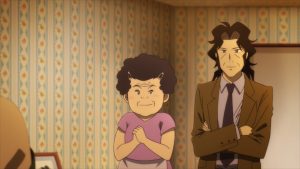 But I call bullshit at that point – with Piano no Mori, with anime, with probably 99% of fiction in this genre. We don’t respect respect enough – respect for the score. Respect for the composer. Respect for the performer who can understand the essence of the composer’s intent and execute it. And yes, respect for the rules. That’s why characters like Shuuhei will always get the short end of the stick in stories like this, but as far as I’m concerned the judges got it right. In a competition you aren’t supposed to just stop in the middle and re-start, obviously. But you’re also supposed to strike a balance between interpretation and faithfullness. I’ve no doubt Kai’s version was wonderful, but when you enter a competition you commit to play by its rules.
But I call bullshit at that point – with Piano no Mori, with anime, with probably 99% of fiction in this genre. We don’t respect respect enough – respect for the score. Respect for the composer. Respect for the performer who can understand the essence of the composer’s intent and execute it. And yes, respect for the rules. That’s why characters like Shuuhei will always get the short end of the stick in stories like this, but as far as I’m concerned the judges got it right. In a competition you aren’t supposed to just stop in the middle and re-start, obviously. But you’re also supposed to strike a balance between interpretation and faithfullness. I’ve no doubt Kai’s version was wonderful, but when you enter a competition you commit to play by its rules.
A few other thoughts from the competition and beyond:
- Ajino-sensei’s BS story about Mozart saying he wanted the K.280 to go to “the boy in the forest” was a rather brilliant bit of manipulation, if a very convenient dramatic device.
- I’m very glad Shuu’s father doesn’t turn out to be a cold and distant genius, or stern taskmaster. He’s no ogre – he sees that his child is down and as an artist he understands why, and he focuses on the positive.
- Maruyama is an interesting addition, because she brings the facet of what competition does to child performers into the mix. Many young artists deal with the same traumas she does here – and often, with adults unsympathetic to what they’re going through.
 One final note here… It’s interesting that the depiction of Maruyama’s performance, despite minimal detail and almost no actual focus on the fingers and the keyboard, ends up being far more elegant than any of the others. Deprived of the crutch of CGI the animators are forced to rely on style and creativity, and they do that rather well to say the least. I’m sure as a lower priority her performance was done on a limited budget, but that it ends up looking the best of the lot is telling. To generalize, CGI in TV anime is a curse. It almost never adds to the experience when used in bulk – it takes you out of the moment. That shows like Piano no Mori, Golden Kamuy and even Full Metal Panic are unable to get made these days without relying heavily on CGI is an indictment of the current production model, no more and no less.
One final note here… It’s interesting that the depiction of Maruyama’s performance, despite minimal detail and almost no actual focus on the fingers and the keyboard, ends up being far more elegant than any of the others. Deprived of the crutch of CGI the animators are forced to rely on style and creativity, and they do that rather well to say the least. I’m sure as a lower priority her performance was done on a limited budget, but that it ends up looking the best of the lot is telling. To generalize, CGI in TV anime is a curse. It almost never adds to the experience when used in bulk – it takes you out of the moment. That shows like Piano no Mori, Golden Kamuy and even Full Metal Panic are unable to get made these days without relying heavily on CGI is an indictment of the current production model, no more and no less.


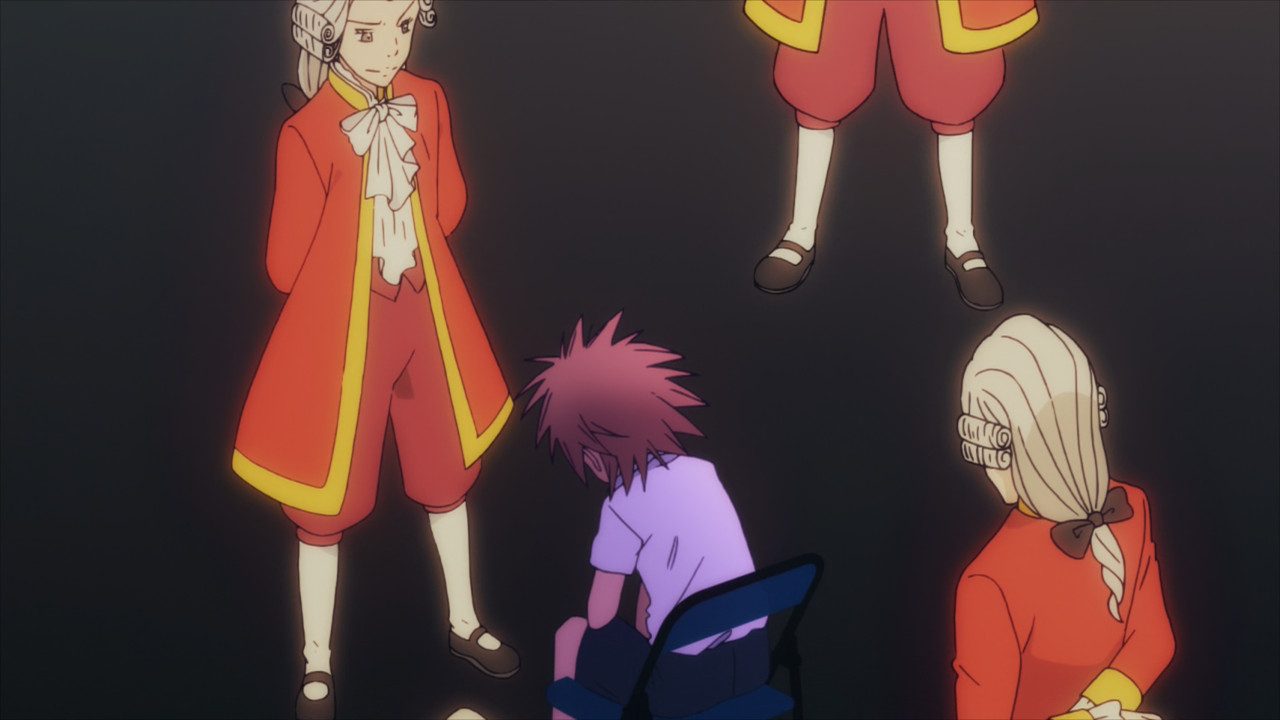
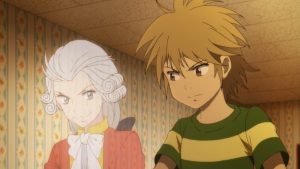

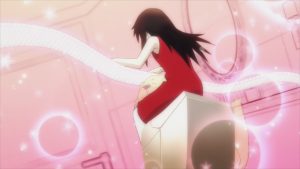
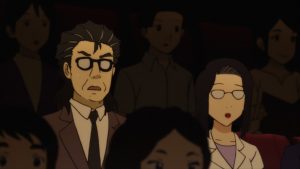
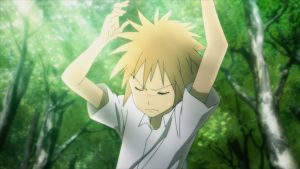
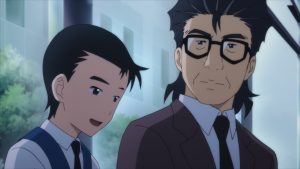

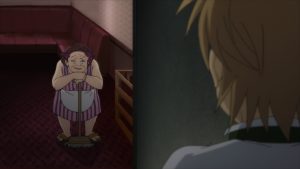
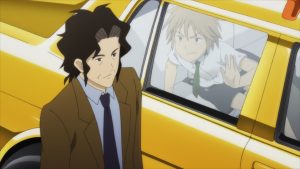

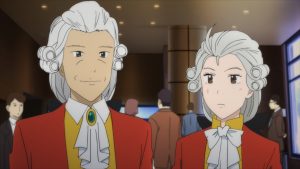
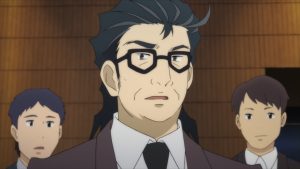

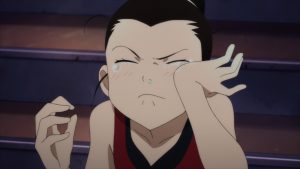
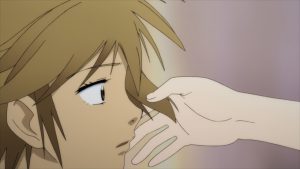
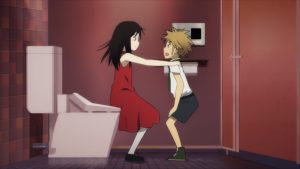
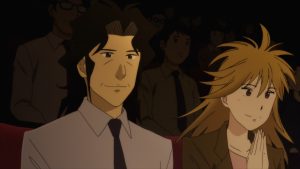



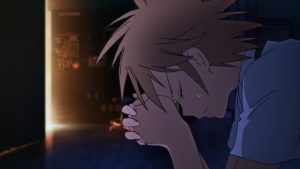

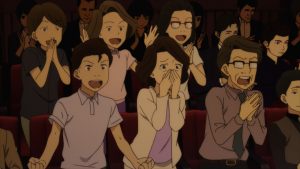
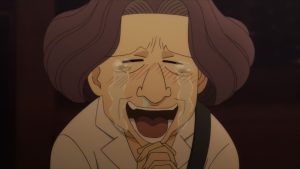


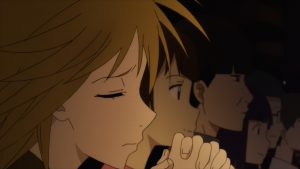

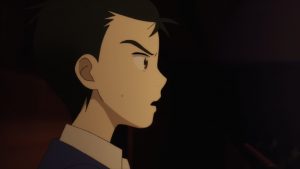
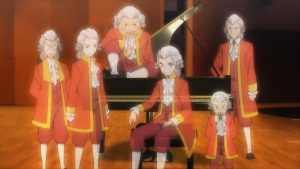
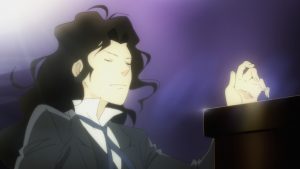
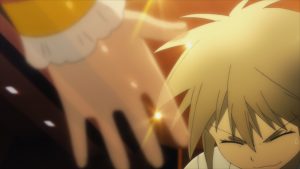
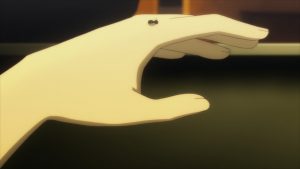
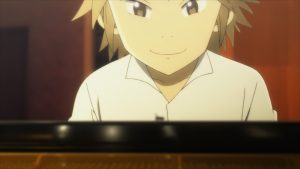
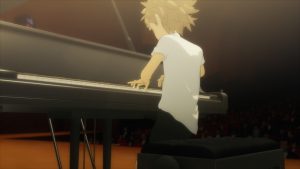

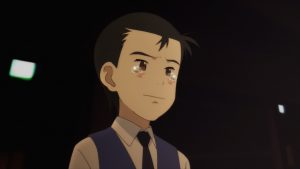
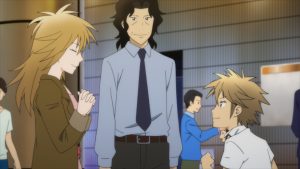

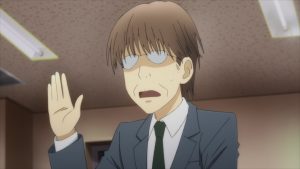
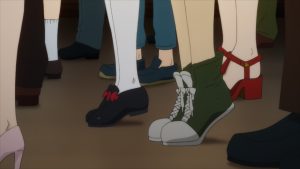
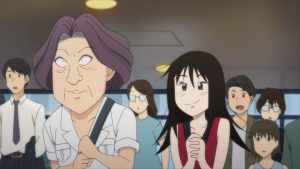
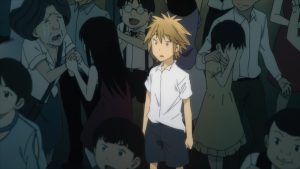
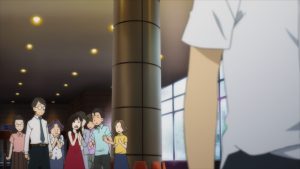
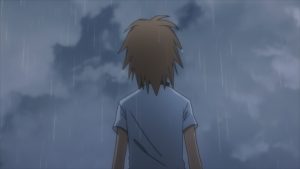
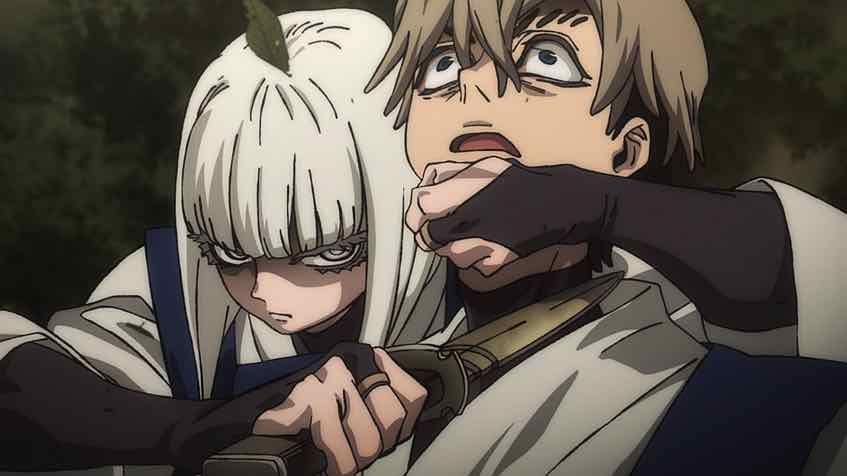
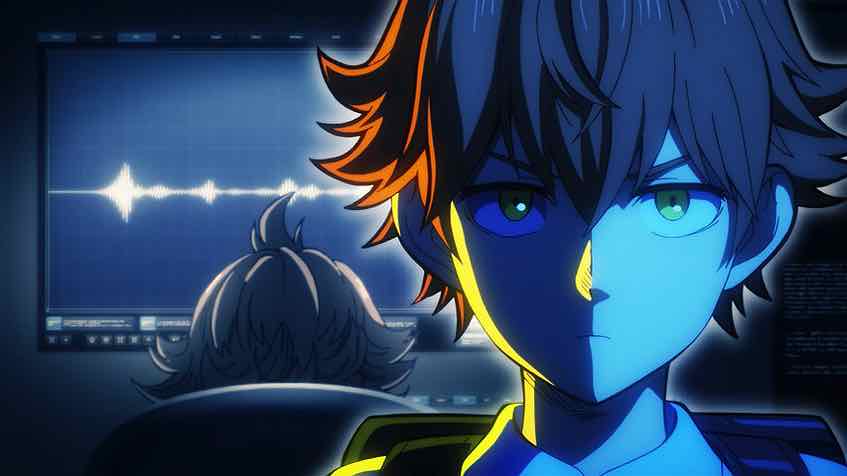
Life
May 2, 2018 at 7:33 pmThank you for reminding me I was watching this show too!
Guardian Enzo
May 3, 2018 at 4:31 amHeh – no problem.
Earthlingzing
May 3, 2018 at 4:12 amOn balance, I would say that Kai’s loss was mostly due to Ajino pushing the “play your own piano” thing. If he wasn’t so insistent on that Kai would have easily got in by imitating his piece.
Guardian Enzo
May 3, 2018 at 4:33 amYes, he would have advanced for sure. Would that have been enough to beat Shuu in the finals? Who knows – but I mean, Ajino is right in pushing Kai to be more than just a tape recorder. Balance is the key – faithful interpretation – and Kai’s strength is the freedom in his playing.
That said though, whatever the reasons behind it in terms of the competition the judges were correct in my view. No way a kid who does what Kai did should be advanced.